Holocaust
Born into a Jewish family in Budapest in 1899, Guttmann, like his parents, became a trained dance instructor before switching his focus to football.
After becoming part of the MTK Hungaria side which won the league title in 1920 and 1921, Guttmann left for Vienna following the rise of anti-Semitism under Miklos Horthy's regime.
It was here, among the Austrian intelligentsia, that he flourished, taking in the political and literary debates in Vienna's coffee-house society.
There he joined the exclusively Jewish football club Hakoah Wien, where he won the league title in 1925 as well as winning four caps for Hungary.
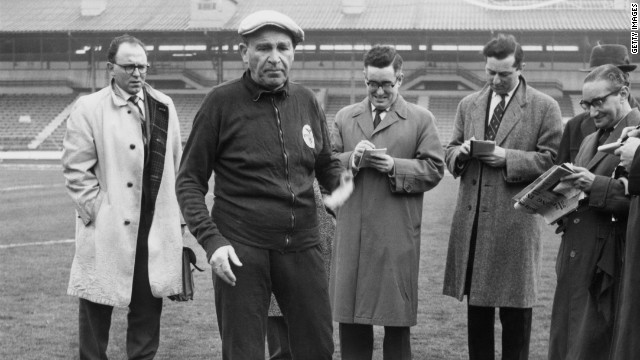 Bela Guttmann was a Hungarian Jew who transformed the face of modern football. He worked across the world, enjoying huge success in Brazil and Portugal, where he won the European Cup on two occasions with Benfica.
Bela Guttmann was a Hungarian Jew who transformed the face of modern football. He worked across the world, enjoying huge success in Brazil and Portugal, where he won the European Cup on two occasions with Benfica.
During his time in Brazil with Sao Paulo between 1957 and 1958, Guttmann introduced the 4-2-4 system which Brazil used at the 1958 World Cup. Pele is pictured here celebrating after scoring in Brazil's 5-2 World Cup final win over Sweden in Stockholm.
Guttmann led Benfica to glory in the 1961 European Cup final, beating Barcelona 3-2. After arriving at the club from Porto in 1960, Guttmann immediately fired 20 of his squad before going on to win the Portuguese league title two years in a row.
Benfica faced then five-time winners Real Madrid in the 1962 final in Amsterdam, where Guttmann's side produced a famous 5-3 victory. Puskas scored a first-half hat-trick for Real against his former manager but it was not enough as Eusebio fired the Lisbon side to glory with two second-half goals.
Eusebio was brought to Benfica from Mozambique by Guttmann in 1961. Under his guidance Eusebio would go on to greatness, establishing himself as one of the game's most talented players. When Guttmann left Benfica after a pay dispute following the 1962 European Cup win, legend has it that he left a curse on the club. He is reported to have told the board that they would never win the title again. The following year, Benfica lost 2-1 to AC Milan in the final -- and suffered defeat in four more since then. Before the 1990 final against AC Milan in Vienna, Eusebio prayed for forgiveness at Guttmann's grave but it did little good as Benfica lost 1-0. That was Benfica's last European Cup final appearance. Many have compared Guttmann with Real Madrid manager Jose Mourinho. The two are said to have shared many traits, including their man-management skills, fiery tempers and winning mentality. Mourinho's father, Felix, played against Guttmann's Benfica side, saving a penalty from Eusebio. Portuguese club Benfica are nicknamed the Eagles and before each home game an eagle flies around the Estadio da Luz. Benfica, who play Barcelona on Wednesday in the Nou Camp, have seven points in Group G as do third-place Celtic, who host Spartak Moscow in Glasgow. Much will be expected of striker Oscar Cardozo has scored nine goals for Benfica this season, with two of them coming in the Champions League group stages. If Benfica are to reach the knockout stages of the Champions League they will have to shackle the talents of Lionel Messi, who has already scored 84 goals during 2012. The Argentine needs two more goals to break Gerd Muller's all-time record of 85 goals in a calendar year.
Eusebio was brought to Benfica from Mozambique by Guttmann in 1961. Under his guidance Eusebio would go on to greatness, establishing himself as one of the game's most talented players. When Guttmann left Benfica after a pay dispute following the 1962 European Cup win, legend has it that he left a curse on the club. He is reported to have told the board that they would never win the title again. The following year, Benfica lost 2-1 to AC Milan in the final -- and suffered defeat in four more since then. Before the 1990 final against AC Milan in Vienna, Eusebio prayed for forgiveness at Guttmann's grave but it did little good as Benfica lost 1-0. That was Benfica's last European Cup final appearance. Many have compared Guttmann with Real Madrid manager Jose Mourinho. The two are said to have shared many traits, including their man-management skills, fiery tempers and winning mentality. Mourinho's father, Felix, played against Guttmann's Benfica side, saving a penalty from Eusebio. Portuguese club Benfica are nicknamed the Eagles and before each home game an eagle flies around the Estadio da Luz. Benfica, who play Barcelona on Wednesday in the Nou Camp, have seven points in Group G as do third-place Celtic, who host Spartak Moscow in Glasgow. Much will be expected of striker Oscar Cardozo has scored nine goals for Benfica this season, with two of them coming in the Champions League group stages. If Benfica are to reach the knockout stages of the Champions League they will have to shackle the talents of Lionel Messi, who has already scored 84 goals during 2012. The Argentine needs two more goals to break Gerd Muller's all-time record of 85 goals in a calendar year.
After traveling on a tour to the U.S. with Hakoah, Guttmann decided to stay put in New York only to lose a considerable amount of money in the Wall Street crash.
That forced the nomadic traveler to move on once again, first back to Vienna where he took on a coaching role with Hakoah before joining Dutch side SC Enschede.
But Guttmann's life, like those of so many other Jews, was turned on its head during the rise of Hitler in Europe and the Holocaust which killed six million people.
"Guttmann was hugely talented," says leading football writer Jonathan Wilson, author of the book "Outsider: A History of the Goalkeeper."
"He was tactically very astute but also very awkward and difficult," Wilson told CNN. "He was very quick to take offense.
"The central theme with Guttmann is the war. We don't know how he survived it, and the fact he skips over it in his book could mean one of two things.
"Did he feel guilty for surviving or did he compromise himself to stay alive?
"Or, perhaps it was that the memories were just too painful to share and that the loss of so many of his loved ones meant he didn't speak about it.
"He was hugely successful but there was something tragic about him, which probably comes from that time."

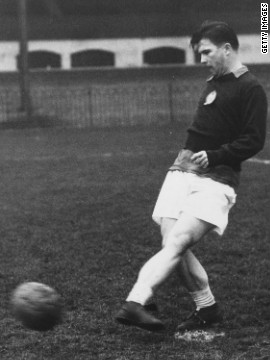
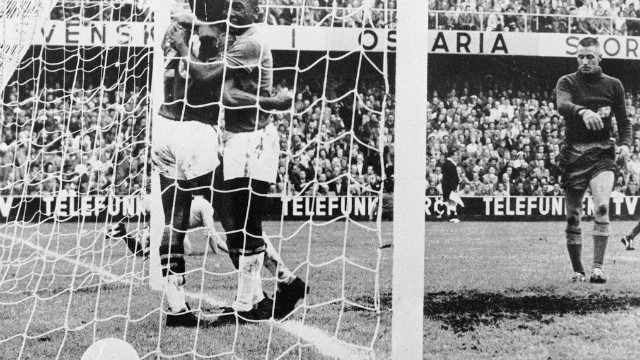 During his time in Brazil with Sao Paulo between 1957 and 1958, Guttmann introduced the 4-2-4 system which Brazil used at the 1958 World Cup. Pele is pictured here celebrating after scoring in Brazil's 5-2 World Cup final win over Sweden in Stockholm.
During his time in Brazil with Sao Paulo between 1957 and 1958, Guttmann introduced the 4-2-4 system which Brazil used at the 1958 World Cup. Pele is pictured here celebrating after scoring in Brazil's 5-2 World Cup final win over Sweden in Stockholm.
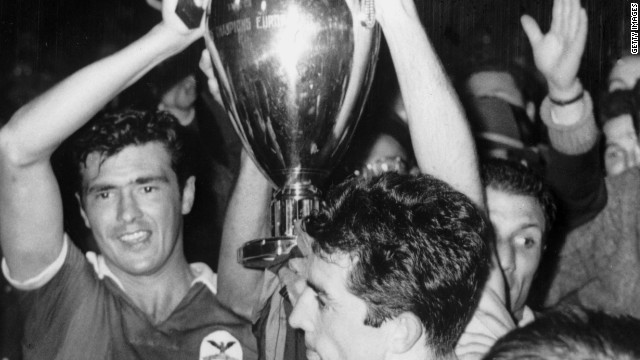 Guttmann led Benfica to glory in the 1961 European Cup final, beating Barcelona 3-2. After arriving at the club from Porto in 1960, Guttmann immediately fired 20 of his squad before going on to win the Portuguese league title two years in a row.
Guttmann led Benfica to glory in the 1961 European Cup final, beating Barcelona 3-2. After arriving at the club from Porto in 1960, Guttmann immediately fired 20 of his squad before going on to win the Portuguese league title two years in a row.
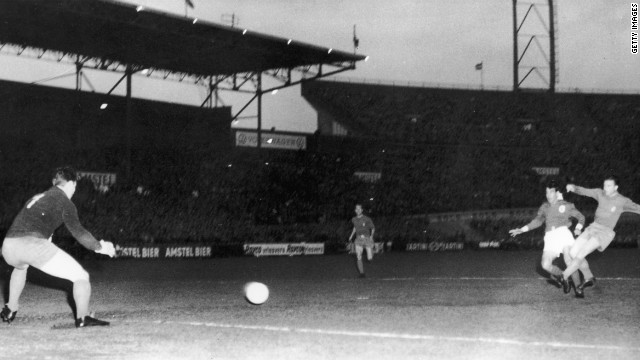 Benfica faced then five-time winners Real Madrid in the 1962 final in Amsterdam, where Guttmann's side produced a famous 5-3 victory. Puskas scored a first-half hat-trick for Real against his former manager but it was not enough as Eusebio fired the Lisbon side to glory with two second-half goals.
Benfica faced then five-time winners Real Madrid in the 1962 final in Amsterdam, where Guttmann's side produced a famous 5-3 victory. Puskas scored a first-half hat-trick for Real against his former manager but it was not enough as Eusebio fired the Lisbon side to glory with two second-half goals. 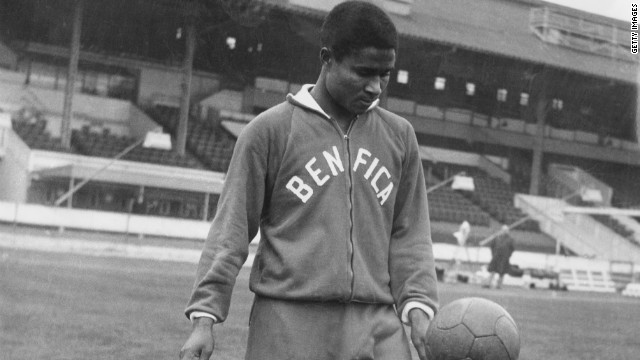 Eusebio was brought to Benfica from Mozambique by Guttmann in 1961. Under his guidance Eusebio would go on to greatness, establishing himself as one of the game's most talented players.
Eusebio was brought to Benfica from Mozambique by Guttmann in 1961. Under his guidance Eusebio would go on to greatness, establishing himself as one of the game's most talented players.
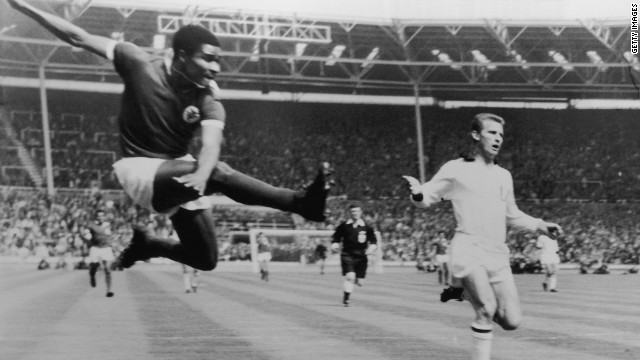 When Guttmann left Benfica after a pay dispute following the 1962 European Cup win, legend has it that he left a curse on the club. He is reported to have told the board that they would never win the title again. The following year, Benfica lost 2-1 to AC Milan in the final -- and suffered defeat in four more since then.
When Guttmann left Benfica after a pay dispute following the 1962 European Cup win, legend has it that he left a curse on the club. He is reported to have told the board that they would never win the title again. The following year, Benfica lost 2-1 to AC Milan in the final -- and suffered defeat in four more since then.
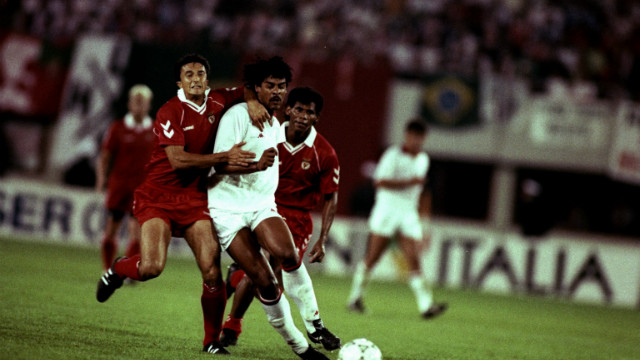 Before the 1990 final against AC Milan in Vienna, Eusebio prayed for forgiveness at Guttmann's grave but it did little good as Benfica lost 1-0. That was Benfica's last European Cup final appearance.
Before the 1990 final against AC Milan in Vienna, Eusebio prayed for forgiveness at Guttmann's grave but it did little good as Benfica lost 1-0. That was Benfica's last European Cup final appearance.
 Many have compared Guttmann with Real Madrid manager Jose Mourinho. The two are said to have shared many traits, including their man-management skills, fiery tempers and winning mentality. Mourinho's father, Felix, played against Guttmann's Benfica side, saving a penalty from Eusebio.
Many have compared Guttmann with Real Madrid manager Jose Mourinho. The two are said to have shared many traits, including their man-management skills, fiery tempers and winning mentality. Mourinho's father, Felix, played against Guttmann's Benfica side, saving a penalty from Eusebio.
 Portuguese club Benfica are nicknamed the Eagles and before each home game an eagle flies around the Estadio da Luz.
Portuguese club Benfica are nicknamed the Eagles and before each home game an eagle flies around the Estadio da Luz.
 Benfica, who play Barcelona on Wednesday in the Nou Camp, have seven points in Group G as do third-place Celtic, who host Spartak Moscow in Glasgow. Much will be expected of striker Oscar Cardozo has scored nine goals for Benfica this season, with two of them coming in the Champions League group stages.
Benfica, who play Barcelona on Wednesday in the Nou Camp, have seven points in Group G as do third-place Celtic, who host Spartak Moscow in Glasgow. Much will be expected of striker Oscar Cardozo has scored nine goals for Benfica this season, with two of them coming in the Champions League group stages.
 If Benfica are to reach the knockout stages of the Champions League they will have to shackle the talents of Lionel Messi, who has already scored 84 goals during 2012. The Argentine needs two more goals to break Gerd Muller's all-time record of 85 goals in a calendar year.
If Benfica are to reach the knockout stages of the Champions League they will have to shackle the talents of Lionel Messi, who has already scored 84 goals during 2012. The Argentine needs two more goals to break Gerd Muller's all-time record of 85 goals in a calendar year.

No comments:
Post a Comment